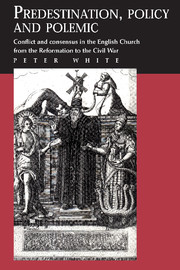 Predestination, Policy and Polemic
Predestination, Policy and Polemic Published online by Cambridge University Press: 11 September 2009
The Lambeth Articles
On 27 February 1595, William Whitaker, Master of St John's College in the University of Cambridge, and Regius Professor of Divinity, delivered a public divinity lecture ‘against those who assert universal grace’. Whitaker's target (although he did not mention him by name) was the Lady Margaret Professor of Divinity, Peter Baro, and his following in the university. The stage was set for a trial of strength between two rival academic factions, which before long involved both archbishops and the queen, with repercussions the importance of which it would be hard to exaggerate for the Church of England. The Lambeth Articles, which grew out of the crisis, have become a byword for a rigid Calvinism to which, it is usually claimed, both Whitgift (after, perhaps, some initial hesitation) and Matthew Hutton subscribed. It will be contended here that on the contrary the archbishops were throughout theologically independent of the two factions, that neither was in any meaningful sense a Calvinist, and that the Lambeth Articles were intended by Whitgift to put a rein on both Calvinists and anti-Calvinists in the university.
Baro did not immediately reply to Whitaker, but a young fellow of Caius College, William Barrett, did. His sermon, preached in the university church on 29 April, was a counter-attack on late sixteenth-century high Calvinism at what Barrett conceived to be its weakest points: its doctrines of assurance, perseverance and irrespective reprobation. Barrett denied that anyone, apart from a special revelation, could be so certain of his faith that he was ‘secure’ of his salvation. Final perseverance, he argued, was contingent; to hold otherwise was arrogant and impious.
To save this book to your Kindle, first ensure no-reply@cambridge.org is added to your Approved Personal Document E-mail List under your Personal Document Settings on the Manage Your Content and Devices page of your Amazon account. Then enter the ‘name’ part of your Kindle email address below. Find out more about saving to your Kindle.
Note you can select to save to either the @free.kindle.com or @kindle.com variations. ‘@free.kindle.com’ emails are free but can only be saved to your device when it is connected to wi-fi. ‘@kindle.com’ emails can be delivered even when you are not connected to wi-fi, but note that service fees apply.
Find out more about the Kindle Personal Document Service.
To save content items to your account, please confirm that you agree to abide by our usage policies. If this is the first time you use this feature, you will be asked to authorise Cambridge Core to connect with your account. Find out more about saving content to Dropbox.
To save content items to your account, please confirm that you agree to abide by our usage policies. If this is the first time you use this feature, you will be asked to authorise Cambridge Core to connect with your account. Find out more about saving content to Google Drive.